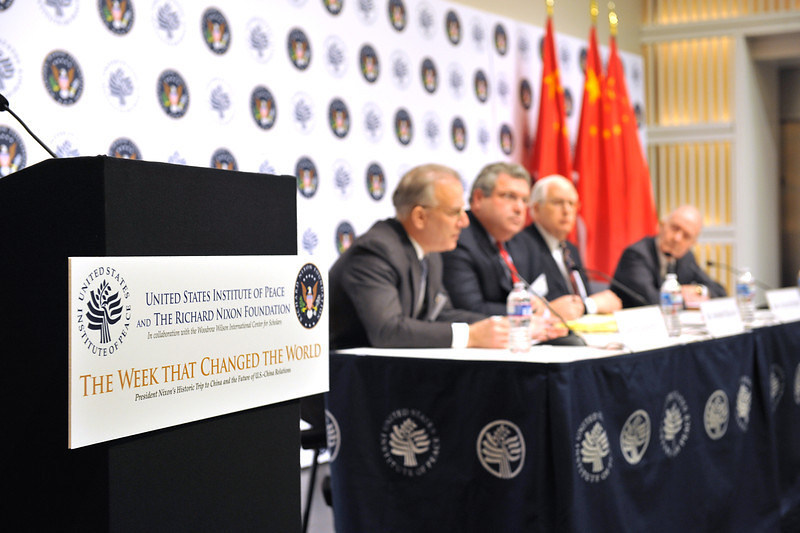The Week That Changed The World
President Nixon’s Historic Trip to China and the Future of US-China Relations
Read the event coverageOn March 7th, USIP and the Richard Nixon Foundation hosted a day-long symposium marking the 40th Anniversary of President Nixon’s extraordinary meetings with leaders of the People’s Republic of China. President Nixon’s trip was a watershed moment for the Sino-American relationship and its effects are still being felt today. The conference focused primarily on examining the origins of the trip, the current status of Sino-American relations and the outlook for the future of this critical bilateral relationship.

The United States Institute of Peace and the Richard Nixon Foundation, in cooperation with the Kissinger Institute on China and the United States at the Woodrow Wilson International Center for Scholars, hosted a day-long symposium marking the 40th Anniversary of President Nixon’s extraordinary meetings with leaders of the People’s Republic of China. President Nixon’s trip was a watershed moment for the Sino-American relationship and its effects are still being felt today. The conference focused primarily on examining the origins of the trip, the current status of Sino-American relations and the outlook for the future of this critical bilateral relationship.
The morning program for the conference featured a keynote from His Excellency Yang Jiechi, Foreign Minister of the People’s Republic of China, and a conversation with former National Security Adviser Dr. Zbigniew Brzezinski. The lunch address featured a discussion with Dr. Henry Kissinger, moderated by Mr. Tom Brokaw. The panels included a wide-array of distinguished business leaders, diplomats, analysts, and journalists, including General Brent Scowcroft, Ted Koppel, Fred Bergsten, Mike Chinoy and Mike Lampton. The day's events concluded with remarks from U.S. Secretary of State Hillary Clinton.
Agenda
Welcome remarks
- Ambassador Richard H. Solomon, President, United States Institute of Peace
- Ambassador Zhang Yesui, Embassy of the People's Republic of China
- Mr. Ronald H. Walker, Chairman of the Board, Richard Nixon Foundation
Opening video keynote by His Excellency Yang Jiechi, Foreign Minister of the People’s Republic of China
Introduction by Ambassador Stapleton Roy, Director, Kissinger Institute on China and the United States, Woodrow Wilson Center for International Scholars
Opening Panel: “Changing the Cold War World"
Introduction by Ambassador Richard H. Solomon
Moderated by David Ignatius, The Washington Post
- Dr. Robert Kagan, Senior Fellow in Foreign Policy, Brookings Institution
- Ambassador Stapleton Roy, Director, Kissinger Institute on China and the United States, Woodrow Wilson Center for International Scholars
- General Brent Scowcroft, President, The Scowcroft Group
A Conversation with Dr. Zbigniew Brzezinski
Introduction by Ambassador Stapleton Roy
Moderated by Margaret Warner, PBS NewsHour
A Discussion with Dr. Henry A. Kissinger
Introduction by Ronald H. Walker
Moderated by Tom Brokaw, NBC News
Read more about Dr. Kissinger's remarks
Concurrent Panels
I. Coping with an Economic Juggernaut
Introduction by Dwight Chapin, Chapin Enterprises
Moderated by Dr. Fred Bergsten, Director, Peterson Institute for International Economics
- Hon. Babara Franklin, President and CEO, Barbara Franklin Enterprises
- Maurice "Hank" Greenberg, Chairman and CEO, C.V. Starr Co., Inc.
- Dr. Robert Hormats, Under Secretary of State for Economic Growth, Energy, and the Environment
- Dr. Nicholas Lardy, Anthony M. Solomon Senior Fellow, Peterson Institute for International Economics
II: China’s Domestic Evolution: From Mao Zedong to Deng Xiaoping to the 21st Century
Introduction by David Sanger, New York Times
Moderated by Dr. David M. Lampton, Dean of Faculty, Professor of China Studies; Director of the China Studies Program, Johns Hopkins University
- Dr. Kenneth Lieberthal, Director, John L. Thornton China Center, Brookings Institution
- Dr. Susan Shirk, Director, University of California Institute on Global Conflict and Cooperation
- Dr. Ezra Vogel, Henry Ford II Professor of the Social Sciences Emeritus, Harvard University
III: Changing Public Perceptions of China from Nixon to Obama
Introduction by Ambassador Richard H. Solomon
Moderated by Mike Chinoy, Senior Fellow, USC U.S.-China Institute
- Marcus Brauchli, Executive Editor, The Washington Post
- Jim Laurie, President, Focus Asia Productions HK Ltd.
- Melinda Liu, Beijing Bureau Chief, Newsweek
- James Mann, Foreign Policy Institute Author-in-Residence, Johns Hopkins SAIS
- Jerrold Schecter, Chairman, Schecter Communications
Closing Panel: “The Future of U.S. – China Relations”
Introduction by Tara Sonenshine, Executive Vice President, United States Institute of Peace
Moderated by Ted Koppel, NBC News
- Dr. Jeffrey Bader, John C. Whitehead Senior Fellow in International Diplomacy, Brookings Institution
- Admiral Dennis Blair, USN (ret.), Former Director of National Intelligence
- Hon. Carla Hills, Chairman and CEO, Hills and Company
- Dr. Cheng Li, Director of Research, John L. Thornton China Center, Brookings Institution
Remarks by Secretary of State Hillary R. Clinton
Introduction by Tara Sonenshine and Patricia Nixon Cox




